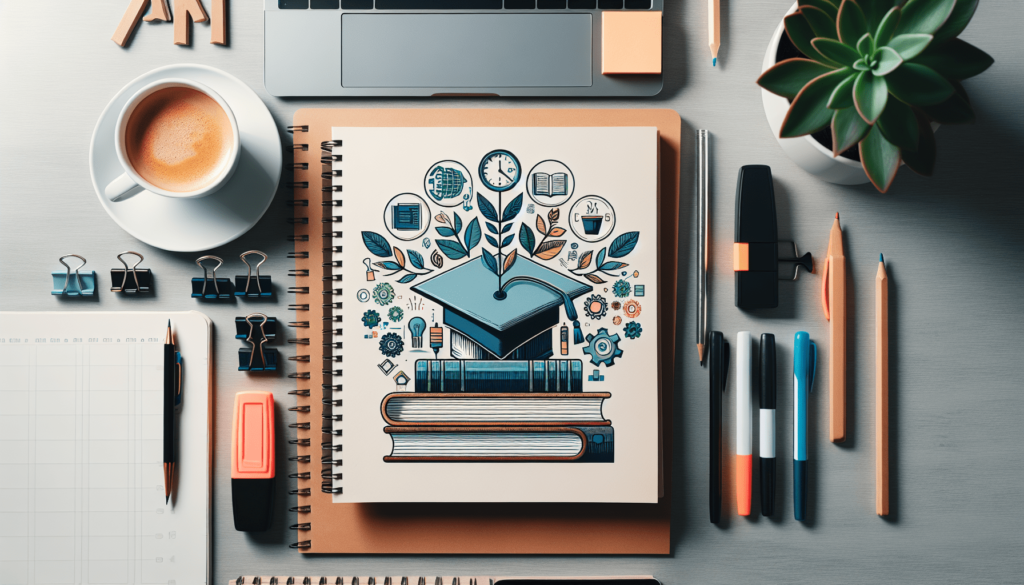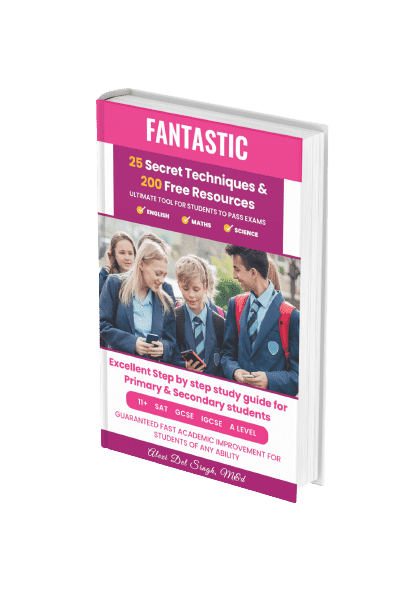Looking to improve your study habits and sharpen your academic skills? Look no further! In this article, we will explore a variety of effective study strategies that are sure to boost your learning and help you achieve success in your studies. From revision tips and exam techniques to time management and critical thinking, we’ve got you covered. Discover the best ways to tackle GCSE Maths, Algebra, Geometry, Trigonometry, and more. Whether you’re preparing for exams, struggling with exam anxiety, or simply looking to enhance your mathematical concepts, this comprehensive guide has something for everyone. So grab your pens and notebooks, and let’s dive into the world of effective study strategies!
Time Management
Managing your time effectively is crucial for academic success. Creating a study schedule is the first step towards efficient time management. By allocating specific time slots for each subject or task, you can ensure that you cover all the necessary material and avoid last-minute cramming.
Setting realistic goals is another important aspect of time management. Be honest with yourself about what you can accomplish within a given timeframe, and break your goals down into smaller, actionable tasks. This will help you stay motivated and avoid feeling overwhelmed.
Prioritizing tasks is essential when managing your time. Identify the most important and urgent assignments or studying that needs to be done, and tackle those first. By focusing on high-priority tasks, you can make sure you have enough time to complete them thoroughly.
Using a planner or digital calendar can greatly assist in managing your time effectively. Write down your study schedule, deadlines, and any other commitments, so you have a clear visual representation of your daily and weekly tasks. This will help you stay organized and avoid forgetting important deadlines or appointments.
Breaking tasks into smaller chunks can make them more manageable and less daunting. Instead of trying to study an entire chapter of a textbook at once, divide it into smaller sections and tackle each section separately. This will help you stay focused and retain information more effectively.
Multitasking may seem like a time-saving strategy, but it can actually hinder your productivity. Instead of trying to study multiple subjects simultaneously, focus on one task at a time. This will allow you to give your full attention to each subject and avoid confusion or mistakes.
Finally, don’t forget to take regular breaks. Studying for long periods without breaks can lead to mental fatigue and decreased productivity. Take short breaks every hour or so, during which you can stretch, grab a snack, or simply relax. These breaks will refresh your mind and help you maintain focus throughout your study session.
Effective Note-Taking
Taking effective notes is crucial for retaining information and organizing your thoughts. Active listening in class is the first step towards successful note-taking. Pay close attention to the teacher or lecturer, engage in discussions, and ask questions when needed. Being actively involved in the learning process will help you understand and absorb the material more effectively.
Organizing your notes using headings and subheadings is an excellent strategy to help you find information quickly and review it efficiently. By dividing your notes into different sections, you can navigate through them more easily and locate specific information when needed.
Using abbreviations and symbols can help you write faster and save time during lectures or class discussions. Develop your own set of abbreviation codes or symbols that you can understand easily. This will allow you to take notes more efficiently and capture key points without missing important information.
Highlighting important information while taking notes is a great way to emphasize key concepts or ideas. Use different colors or underline important text to make it stand out. When reviewing your notes, these highlighted sections will help you quickly identify the most crucial information.
Regularly reviewing and revising your notes is essential for retaining information in the long term. Set aside time each week to go through your notes and reinforce your understanding of the material. Take the opportunity to fill in any gaps or clarify any confusing points.
Summarizing key points is an effective way to condense information and reinforce your understanding of the material. After each study session or lecture, write a brief summary of the main points covered. This will help you consolidate your knowledge and make it easier to review later.
Using color coding or mind maps can help you visually organize information and make connections between different topics or concepts. Assign different colors to different themes or subtopics, or create mind maps that visually represent the relationships between various ideas. These visual aids can improve your overall understanding and help you remember information more effectively.

Active Learning Techniques
Engaging in discussions is an effective way to deepen your understanding of a topic. Participate actively in class discussions, ask questions, and share your own perspectives. Engaging with the material and exchanging ideas with classmates can help you gain new insights and reinforce your knowledge.
Teaching concepts to others is a powerful learning strategy. Explaining a concept or a problem to someone else forces you to articulate your thoughts clearly and solidify your understanding. Find a study partner or join study groups where you can take turns teaching and learning from each other.
Participating in group study sessions can enhance your learning experience. Collaborating with classmates allows you to tackle challenging problems together, share different perspectives, and learn from each other’s strengths and weaknesses. Group study sessions also provide accountability and motivation to stay on track with your studies.
Using flashcards for memorization is a classic study technique. Write questions or key terms on one side of the flashcard and the corresponding answers or definitions on the other side. Test yourself regularly by flipping through the flashcards and trying to recall the information. This active recall method strengthens your memory and helps you retain information more effectively.
Creating mnemonic devices is a fun and creative way to remember information. Mnemonics are memory aids that use associations, acronyms, or rhymes to help you remember complex information. For example, to remember the order of operations in mathematics (PEMDAS: Parentheses, Exponents, Multiplication and Division, Addition and Subtraction), you could create a sentence like “Please Excuse My Dear Aunt Sally.”
Practicing retrieval by testing yourself is an effective way to reinforce your learning. After studying a topic, quiz yourself or create practice questions to test your knowledge. This active recall technique strengthens your memory and identifies areas where you may need to review or study further.
Applying concepts to real-life scenarios helps you understand how the material relates to the world outside the classroom. Look for opportunities to apply your knowledge in practical situations. By connecting academic concepts to real-life examples, you’ll develop a deeper understanding and enhance your problem-solving skills.
Effective Reading Strategies
Applying effective reading strategies can greatly enhance your comprehension and retention of the material. Before diving into a text, previewing the material is a helpful strategy. Skim through the headings, subheadings, and any introductory or concluding paragraphs to get a sense of the main ideas and structure of the text.
Highlighting or underlining important passages while reading can help you focus on key information and make it easier to review later. However, use these methods sparingly to avoid excessive highlighting and losing the overall context.
Taking notes while reading is an excellent strategy to actively engage with the material. Jot down key points, summaries, or any questions or thoughts that arise as you read. These notes will serve as a reference for reviewing and reinforcing your understanding of the material.
Summarizing each section after reading is a powerful strategy to consolidate your knowledge and ensure comprehension. Write down a brief summary of the main ideas and key arguments of each section. This will help you organize and retain the information more effectively.
Asking questions while reading can improve your comprehension and critical thinking skills. When something is unclear or you need further clarification, write down your questions and seek answers either through further reading or by consulting your teacher or classmates.
Using visualization techniques can enhance your understanding and retention of the material. Try to create mental images or diagrams that represent the information you’re reading. Visualizing concepts can make them more memorable and easier to recall.
Reviewing and reflecting on the material after reading is crucial for reinforcing your learning. Take a few moments to summarize what you’ve read and reflect on its significance. Ask yourself how the information relates to your previous knowledge and the broader context of your studies.

Study Environment
Creating a conducive study environment is key to maintaining focus and productivity. Find a quiet and comfortable place where you can study without distractions. This could be a designated study room, a library, or even a cozy corner in your own home.
Remove distractions such as electronics from your study area. Turn off your phone or put it on silent mode, close unnecessary tabs on your computer, and avoid social media or other tempting distractions. Creating a technology-free zone will help you stay focused and avoid wasting time.
Ensure good lighting and ventilation in your study area. Natural light is ideal, but if that’s not possible, use a well-lit lamp that provides adequate lighting without causing strain on your eyes. Good ventilation is also important for your overall comfort and productivity.
Organize your study materials and resources in a systematic manner. Keep your textbooks, notes, and other study materials within reach and neatly organized. This will save you time and prevent unnecessary frustration when you need to locate specific resources.
Create a clutter-free workspace to promote a sense of calm and productivity. Clear your study area of unnecessary clutter and only keep the materials you need for your current study session. A clean and organized workspace can help reduce distractions and improve your focus.
Personalizing your study area can help create a sense of belonging and motivation. Add personal touches like pictures or motivational quotes that inspire you. Surround yourself with items that uplift your mood and create a positive studying environment.
Memory Enhancement
Enhancing your memory is crucial for academic success. Utilizing mnemonic devices is a powerful technique to remember and recall information. Mnemonics are tools that help you associate information with familiar or easily memorable cues. For example, to remember the order of the planets, you could use the mnemonic “My Very Eager Mother Just Served Us Nachos” (Mercury, Venus, Earth, Mars, Jupiter, Saturn, Uranus, Neptune).
Creating visual or mental associations can also improve memory retention. When learning new information, try to visualize it or create mental images that relate to something you already know. These associations help create stronger connections in your brain, making it easier to recall the information later.
Repeating and reviewing information regularly is essential for strengthening your memory. Research has shown that spacing out your learning and reviewing sessions over time is more effective than cramming. Reviewing material at regular intervals helps reinforce the neural connections associated with that information, making it easier to recall later.
Practice reciting or explaining concepts in your own words. By verbalizing what you’ve learned, you engage different areas of the brain involved in language processing and memory. This active recall technique strengthens your understanding and helps solidify the information in your memory.
Utilize the spaced repetition technique, which involves reviewing and testing material at increasing intervals over time. Start by reviewing immediately after learning, then review again after a day, a week, and progressively longer intervals. This technique optimizes memory retention and helps prevent forgetting.
Applying active recall during studying is more effective than passive reading. Instead of simply re-reading your notes or textbooks, actively test yourself by recalling and explaining the information without referring to your materials. This forces your brain to retrieve the information from memory and strengthens your retention.
Connecting new information with prior knowledge is a powerful memory enhancement technique. By finding connections between new material and existing knowledge, you create a network of associations in your brain. This helps you better understand and remember the new information.
Test-Taking Strategies
Test-taking can be stressful, but employing effective strategies can help you perform at your best. Reading and understanding directions carefully is crucial to avoid making avoidable mistakes. Take the time to read through all instructions before starting the test to ensure you know what is expected of you.
Scanning the entire test before starting can help you plan your time effectively. Get an overview of the number and types of questions, and identify any sections that may require more time or deeper thinking. This will help you allocate your time accordingly and avoid getting stuck on one question.
Answering easy questions first is a smart strategy to build confidence and accumulate points. Start with the questions you find most comfortable or straightforward, as this will boost your morale and give you a head start. By answering the easy questions first, you also avoid wasting time unnecessarily on challenging ones.
Managing your time effectively during the test is crucial for completing all questions. Keep an eye on the time and allocate it wisely among the different sections or types of questions. Pace yourself and avoid spending too much time on any single question, as this may result in you not having enough time for other questions.
Eliminate obviously wrong options when unsure of the correct answer. Sometimes eliminating the obviously incorrect choices can increase your chances of selecting the right answer. Use the process of elimination based on your knowledge and reasoning to narrow down the options.
Using educated guesses can be helpful when you’re uncertain about the correct answer. Make an educated guess based on your knowledge, reasoning, and any clues provided in the question or context. If you can eliminate some incorrect options, your chances of guessing the right answer improve.
Reviewing answers before submitting is a crucial step to catch any mistakes or overlooked details. Take the time to go back and double-check your answers, making sure you haven’t made any careless errors. This final review can help you identify any last-minute corrections to improve your overall score.
Effective Study Resources
Utilizing a variety of study resources can enhance your learning experience. Textbooks, online resources, and educational technology can provide different perspectives and supplementary material to reinforce your understanding.
Accessing practice questions and past papers is a valuable study resource. Practice questions help you become familiar with the format and types of questions you may encounter in tests or exams. Past papers allow you to apply your knowledge to real exam scenarios and practice time management.
Seeking additional help from tutors or study groups can provide valuable insights and support. Tutors can provide personalized guidance and explanations to help clarify challenging concepts. Study groups offer a collaborative learning environment where you can exchange ideas, ask questions, and support each other’s learning.
Making use of interactive apps and websites can make studying more engaging and interactive. Many educational apps and websites offer interactive exercises, quizzes, and multimedia resources that cater to different learning styles. Explore these resources to find ones that resonate with your preferred learning methods.
Exploring subject-specific resources and study guides is particularly important for disciplines like mathematics. Look for resources specifically designed to help you understand and master math concepts. These may include textbooks, online tutorials, video lessons, or interactive problem-solving platforms.
Accessing online courses or tutorials can provide structured and comprehensive learning experiences. Many reputable educational platforms offer online courses taught by experts in various subjects. These courses can supplement your classroom learning and provide additional resources and guidance.
Healthy Study Habits
Maintaining healthy study habits is crucial for your overall well-being and academic performance. Getting enough sleep is essential for optimal cognitive functioning and memory consolidation. Aim for 7-9 hours of quality sleep each night to ensure your brain is well-rested.
Eating nutritious meals fuels your brain and promotes concentration and focus. Opt for balanced meals that include fruits, vegetables, whole grains, and lean proteins. Avoid heavy or sugary foods that can cause energy crashes and make it difficult to concentrate.
Staying hydrated is important for maintaining cognitive function and preventing fatigue. Drink water regularly throughout the day, especially during study sessions. Dehydration can impair your ability to concentrate and negatively affect your overall cognitive performance.
Regular exercise has numerous benefits for both your physical and mental health. Engaging in physical activity helps increase blood flow to the brain, improving cognitive function and memory. Take short breaks between study sessions to engage in physical activity, whether it’s a quick walk, stretching, or simple exercises.
Taking breaks for physical activity is not only good for your physical health but also improves your mental performance. Physical activity increases oxygen flow to the brain, boosting cognitive function and enhancing your ability to focus and retain information. Incorporate short exercise sessions into your study routine to reap these benefits.
Managing stress through relaxation techniques is important for maintaining a positive mindset and reducing anxiety. Practice deep breathing exercises, meditation, or mindfulness techniques to help alleviate stress and promote relaxation. Regularly incorporating these techniques into your study routine can help you stay calm and focused.
Self-Assessment and Reflection
Self-assessment and reflection are crucial aspects of effective study strategies. Evaluating your study strategies and their effectiveness is essential to identify what is working well and what needs improvement. Reflect on the techniques you have been using and assess their impact on your learning outcomes.
Identifying your strengths and weaknesses allows you to capitalize on your strengths while addressing areas of improvement. Reflect on the subjects or study techniques that are more challenging for you and develop strategies to overcome those weaknesses. Seek additional help or resources to enhance your understanding in those areas.
Setting new study goals helps you maintain motivation and focus. Reflect on your overall learning objectives and establish specific, achievable goals. Whether it is mastering a specific topic or improving your time management skills, setting clear goals will give you a sense of direction and purpose.
Reflecting on your learning progress is essential for tracking your development and identifying patterns. Regularly review your academic achievements and milestones. Celebrate your successes and evaluate areas where you may need to adjust your study techniques or seek additional support.
Seeking feedback from teachers or mentors is valuable in gaining an external perspective on your progress and identifying areas for growth. Reach out to your teachers or mentors and request feedback on your performance and study strategies. Use this feedback to make informed decisions on how to further improve your learning.
Adjusting study techniques accordingly based on self-assessment and feedback is crucial for continuous improvement. Embrace a growth mindset and be open to trying new strategies or adjusting existing ones as needed. Adaptability and resilience are key to long-term academic success.





